EVERYONE SAW A CHANGE IN David Hogg. Twitter David would escalate, but in real life, the more vicious the attack, the more likely he flipped to anti-David, calmest person in the room. “He’s the one who brought the love and compassion to even some of the most fringe groups,” said Ryan Deitsch, a survivor of the shooting at Marjory Stoneman Douglas High School (MSD). “David would say, ‘Hey, do you want other people to live?’ ‘Yeah.’ And he says, ‘Well, let’s talk.’ And then within fifteen, ten minutes, they’re hugging it out. The white supremacists, the neo-Nazis—we disagree on a great variety of things, but some of them have been willing to support some of the things we’ve been working with.”
David had spent a lot of time around MSD shooting survivor Emma González, and some of the kids thought she was centering him. “That’s true,” said MSD alum Kaylyn Pipitone, who everyone knew as Pippy. “He’s very much like a kid when Emma’s around.”
Twitter David’s mellowing was more gradual. By May, several of the kids said they had discovered he got less bombastic if they let him vent a little.
“He’s calmer a lot more recently, but when something ticks him off, like on Twitter, you can’t get him out of it, it’s done,” Pippy said. She said he would obsess and intensify until one of them told him just tweet it already. “And he’s like, ‘OK it’s done.’ It doesn’t last long.”
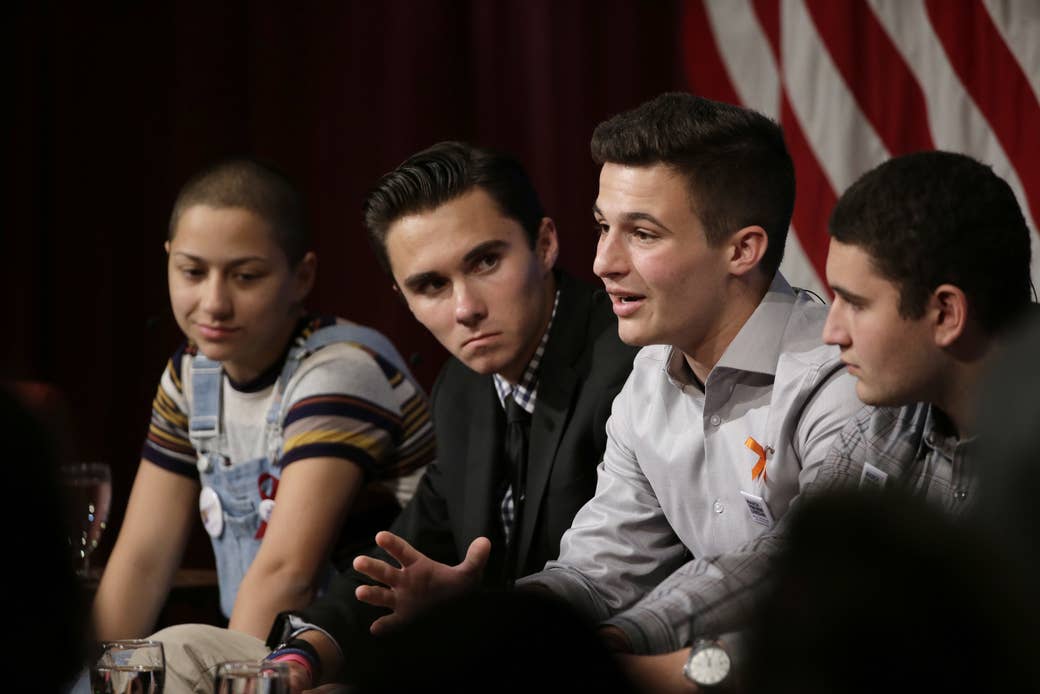
CAMERON KASKY AND David had grown accustomed to the media glare, but it was striking how they dealt with it so differently. Cameron, an MSD survivor, who organized March for Our Lives (MFOL) in his living room, needed his audience to love him. His yearning for validation seemed boundless and dramatic. David didn’t give a shit. In fact, he kind of enjoyed being attacked. Sure, it pissed him off but he relished the counterpunch. Few things made him happier than eviscerating an Internet troll.
I bounced that analysis of the two of them off David. He chuckled and agreed. “Yeah, I would say he kind of needs people’s validation. Just being an actor and all.” He smirked. “Not a crisis actor. I like using acting and theater as a symbolism for politics, because it’s spectacle.” He admitted that you need people to like you to be effective, though. “That’s what politicians need, too. It’s just politicians acting in the real world, and never taking down their facade. For me, I don’t have that facade.” He said his brutal candor was “the best and worst part about me. People know how I feel, and if you’re an asshole, I’m going to say it.”
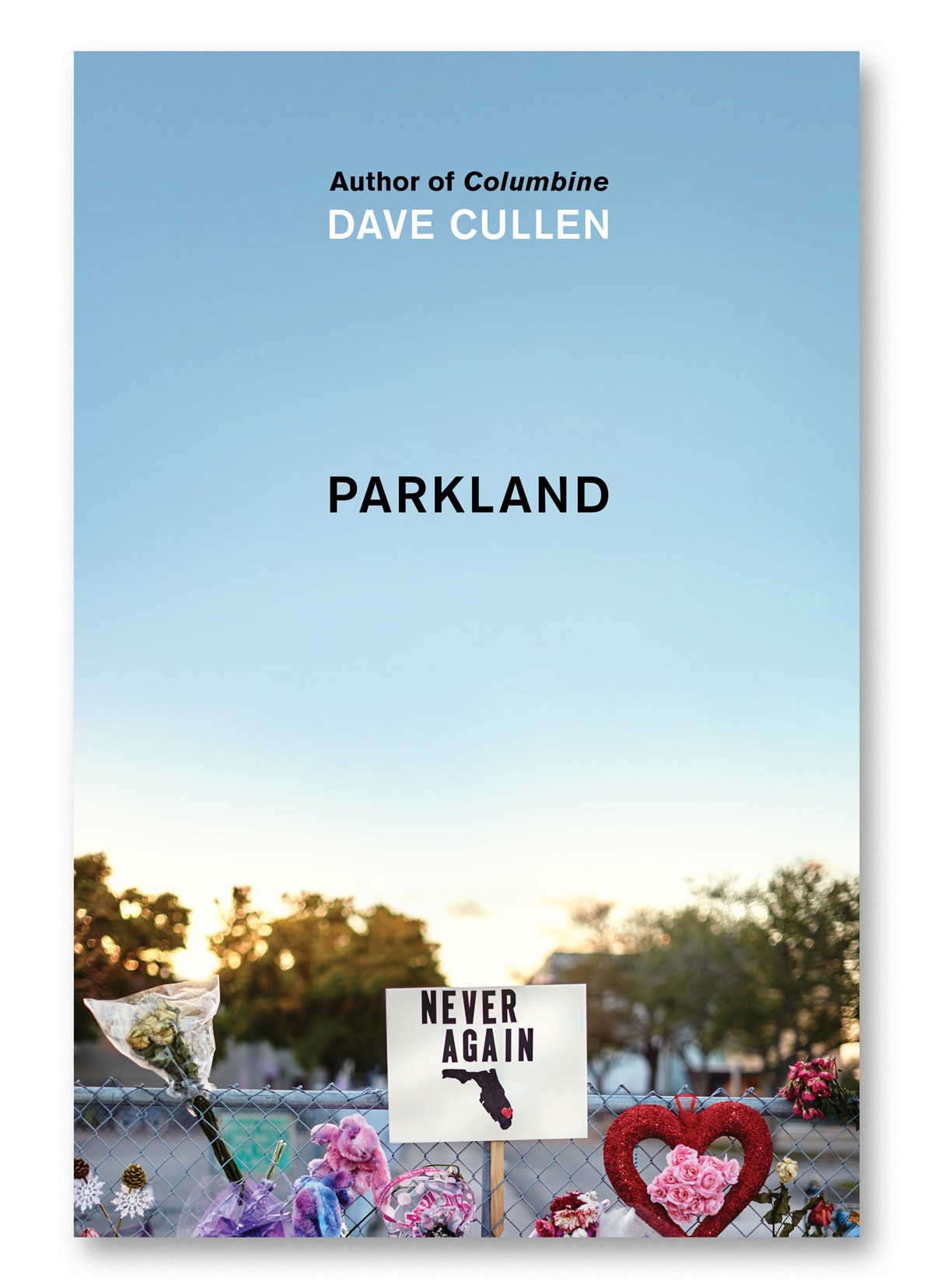
He smiled when he said that. He was smiling a lot now. His parents marveled at the return to serenity—bouts of it, at least. “I just think over time it kind of settled out,” he said. “The anger in this marathon, it’s like a drug. It’s good at getting things done quickly, but not in the longer term. Love and compassion and patience is the stamina you need to make long, substantial change. This is a slow burn. We started out as one spark in a field of tinder, and now we’ve really, really started to burn into the hundred-year-old oaks. That’s what we have to do. If we have to burn down the entire forest to grow a new one, without the sprouting of corruption, through voting, we’ll do it.”
Calmer, but still David. In the middle of his reflection on love and tranquility, the metaphor grabbed hold of him and burned the forest down.
He kept catching himself swearing that visit. He was trying to kick that, at least in interviews. But he still said “fuck” twenty-eight times in two hours. They were softer curses, though, without the vitriol.
The NRA was still most likely to draw a “fuck” out of David. Their five-million-members claim annoyed him. “I highly doubt that. They say they speak for the majority of gun owners. Only one in ten gun owners is actually a member. They’re a loud minority.”
MFOL was speaking for the majority, he said—though he wished his cohort would speak up on Election Days. “Whenever I talk to groups and they ask me why young people vote so little, I look at them blankly and I say it’s because they don’t give a fuck.” David said. “It’s not that hard to get out and vote.”
But he echoed Harvard’s John Della Volpe on how to change that. “People need to see impact,” David said. “For somebody to cross the bridge of fear, they need to see materialization.” The real test wasn’t electing the legislators or passing the legislation, or quibbling about what constitutes “meaningful” change. Those were all means, and only the end mattered: driving down the rate of gun deaths. That was a long way off, and until they reached that threshold, it would be “like trying to prove that bigfoot doesn’t exist.”
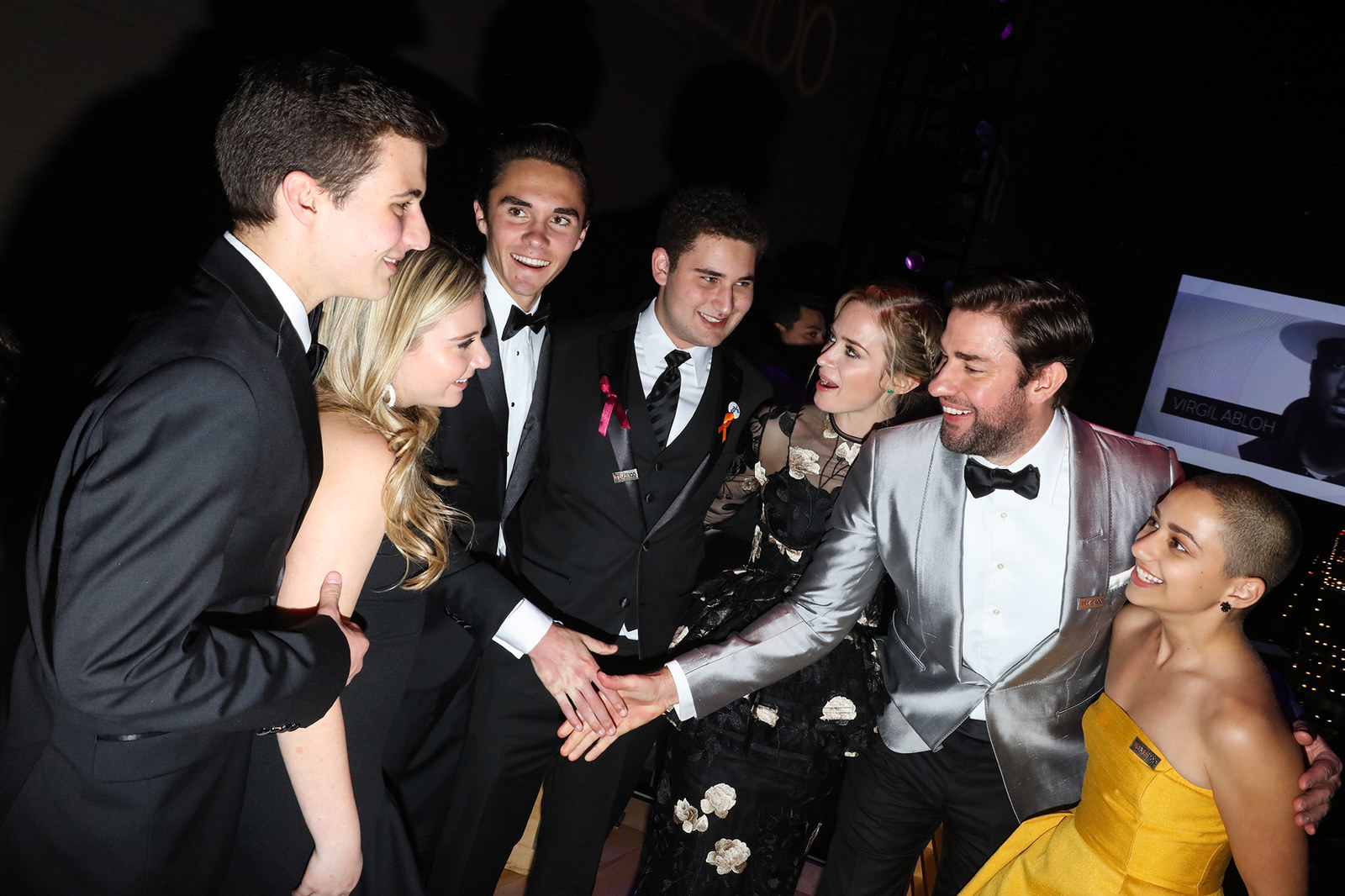
2
CAMERON WAS A BALL OF stress. The musicals were supposed to be a relief from the activism, and they were, but he had loaded up a full plate before his school was attacked. “Obviously, I could barely get him to rehearsal,” said Christine Barclay, the musical’s director and owner of Barclay Performing Arts. “He really did try to abide by the rehearsal schedule, but there were times it was impossible.”
“And try directing him,” Barclay said. She would say, “OK, Cameron, can you please put your phone down?” and he’d say, “I’m texting George Clooney,” or the kids from Sandy Hook. “How do you direct the King of the World? He’s literally become basically famous for talking down to grown-ups, and putting them in their place.” She reconsidered. That was strong, but that’s how it felt. He was a handful. And her hands were literally full with her newborn—the kids got used to her nursing in the rehearsal, calling out directions while Caroline quietly ate. All of them were in over their heads.
It got worse when Cam was under attack. “It kind of got to a point where I kept yelling at everybody online who would harass them,” Barclay said. “I mean, these are kids. Yeah, maybe they’re saying something too aggressively or they’re being a little brazen or being emotional. But these are seventeen-year-old kids. They’re not supposed to know how to handle this. They’re already having enough trouble navigating who they’re taking to prom and what to do with their acne; how are they supposed to know how to handle a media onslaught and people throwing mud at them? It’s like Lord of the Flies.”
Opening night for Spring Awakening was May 2. As showtime hurtled toward them, everyone was feeling the heat. “And the other kids were kind of sitting on pins and needles, because they had been holding down the fort,” Barclay said. “It was like, ‘Dudes, please pull this off, because we’ve been here.’”
But then Obama wrote an article about them, Time named them to its 100 Most Influential list, they were invited to the White House Correspondents’ Dinner . . . it just didn’t stop. “He tried, he really tried, but Cam would come to rehearsals, Alfonso [Calderon, an MSD survivor] would come to rehearsals, all these kids would come to rehearsals from red-eye flights,” Barclay said. “They’d come in looking bleary eyed, and it’s like, ‘OK guys, now you have a seven-hour rehearsal where you have to sing and cry’—and then they’d get on a plane and go back to wherever.”
They had the lines, and the moves, but they were holding back. Barclay was frustrated. “I finally said, ‘You guys are known for your big voices. I can’t hear you!’” Those big media voices, that was the trouble. The stage demands a certain bravado: faking it when you don’t feel it, projecting to the back row. Activism can too, sometimes: tussling with a US senator when you haven’t even begun AP gov class, and you’re certain of the objective but fuzzy on the details, and can never let a whiff of uncertainty show. Broadway actors do it two hours a night, eight shows a week, and they’re exhausted. These kids were spent.
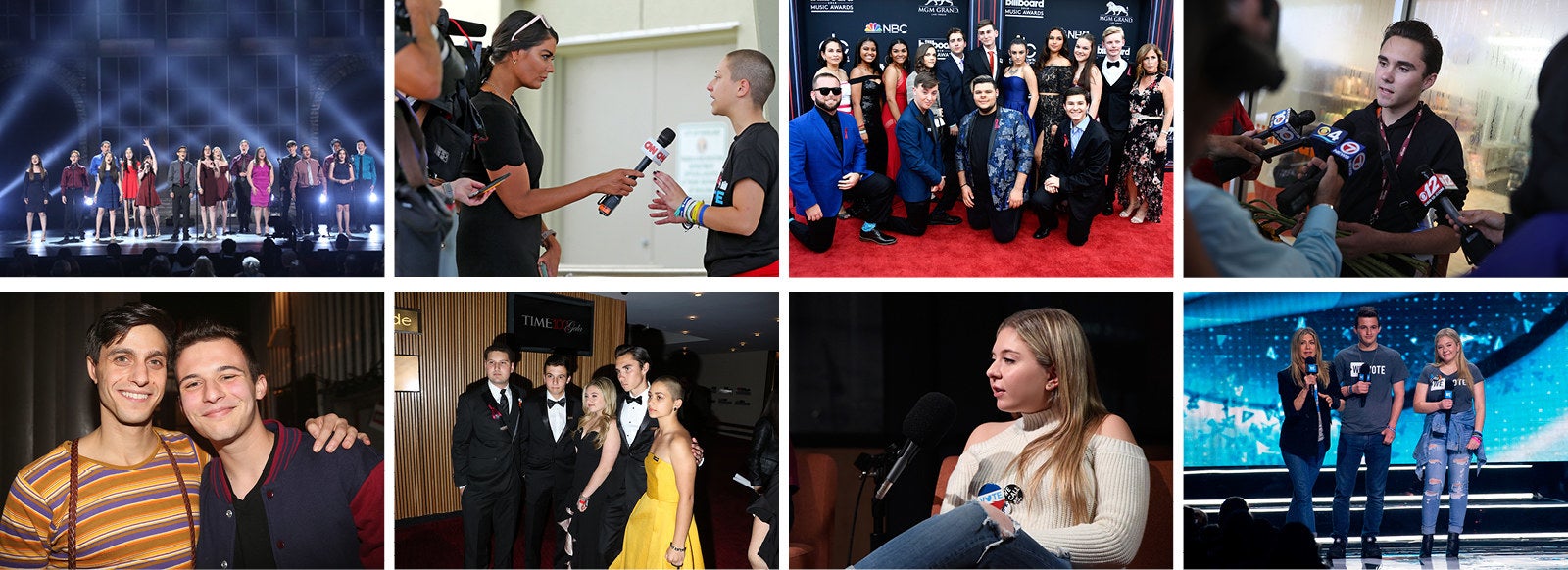
THERE WAS another issue. There was a gunshot. It felt unthinkable to fire a gun in that community that spring, but it was a crucial plot point, the suicide. Moritz, a character in the play, shot himself, and his ghost returned to argue with Cameron in the climactic graveyard scene. Barclay consulted with a lot of people. The conversation veered between “You have to leave it in because it’ll be too much of a statement not to” and “It would be giving in too much if you don’t. You have to rip off the Band-Aid.”
Barclay didn’t bring the gun prop to the set. “We didn’t even want to go there. Ashton Bianchi [a student at a nearby school], who played Moritz, kept using his fingers.” Two days before the opening, Barclay finally brought in a plastic gun. “Everyone took a moment. It’s plastic. I showed it to them when it was still orange, before we sprayed it black. They just kind of stared at it.”
Meanwhile, her assistant director watched a lot of other performances on YouTube and discovered that many omitted the blast. OK, Barclay decided. He would raise it to his mouth, lights out, and the audience would figure it out. “It’s not going to look like we’re afraid,” she said. “I didn’t want it to be overdramatic—just dramatic enough.”
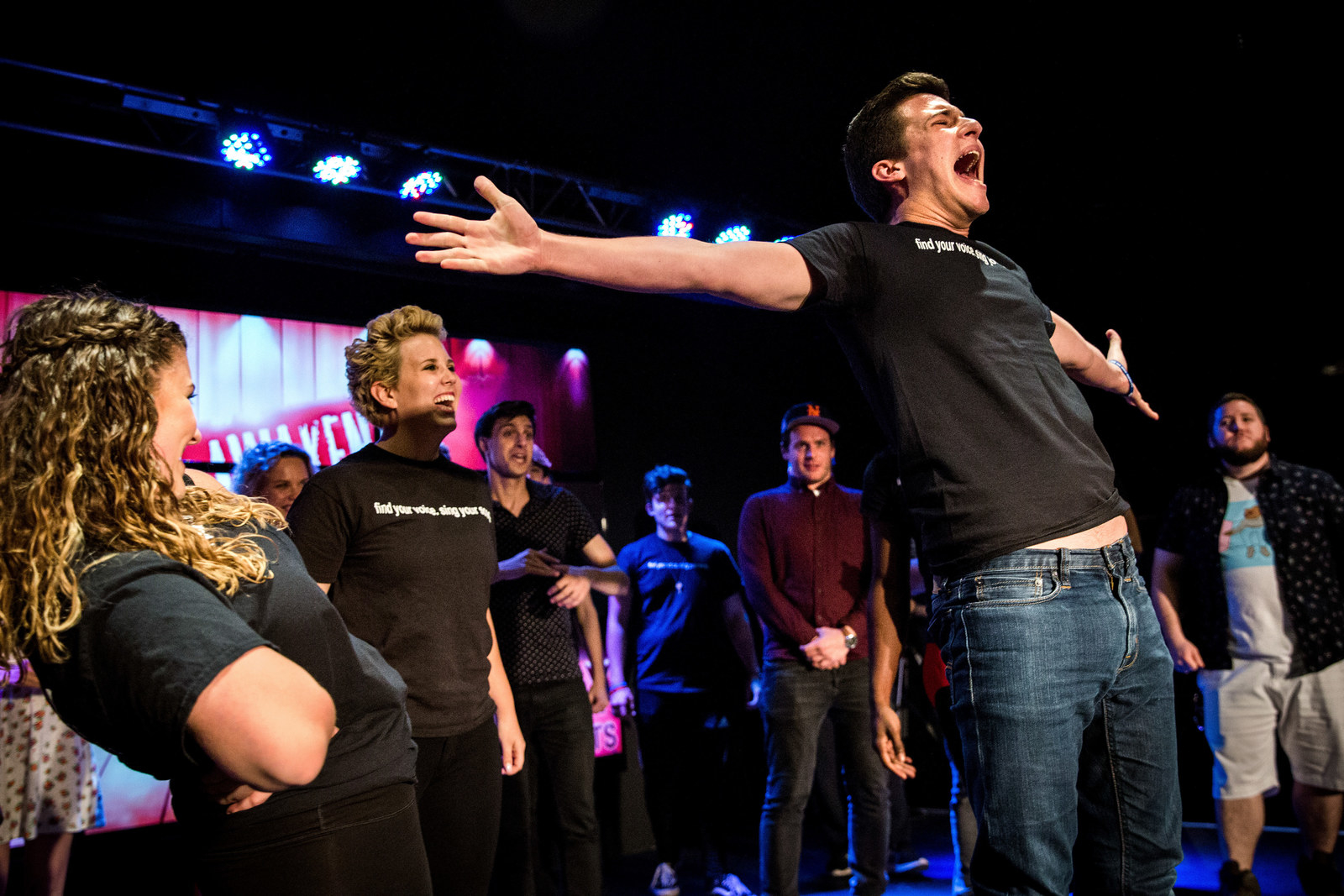
THE ROLLER coaster to opening night was a lot of fun. A group of Broadway and television entertainers staged several Broadway benefits for Parkland, and gave the kids advice over the phone. The show’s creators, Steven Sater and Duncan Sheik, flew down for opening night and did a talk-back with the kids after the show. “We came to honor you guys,” Sater told them. “Because for us, you guys are like a beacon of hope.”
The kids had done their homework. Cameron asked about the Masked Man in the nineteenth-century text. In that incarnation, Moritz goads Cameron’s character, Melchior, to join him in suicide, and the Masked Man appears to coax him to go on. Both are projections of Melchior’s own psyche, Sater said. “That’s the birth of expressionism in the Western theater. A character walks onstage, as present as everyone else, and yet he’s embodying what’s going on in the mind of another character. Some force, subjective and arbitrary, has entered into scene with a character who is in fact projecting him.” There has been a century of debate about the Masked Man. “To me, he’s the principle of life, of going on, of going forward,” Sater said. He and Sheik spent eight years wrestling the material to the Broadway stage, and that Masked Man was a conundrum for much of the ride. They actually included him at the Lincoln Center staging six years in. And then they cut him loose. “What we recognized was that in our production, the music played that role,” Sater said. “It provided the propulsion of the story. The impulse which drove us forward. So we no longer needed the Masked Man himself. He had become kind of an irrelevance, or a redundancy.”
They also jettisoned a key plot point from the final scene: Moritz coaxing his best friend to join him in the grave. What worked in the abstract, in nineteenth-century Germany, felt monstrous in the wake of Columbine. “We didn’t want to see the Moritz we had been rooting for all night come back and betray his friend by urging him to kill himself,” Sater said. “It just didn’t make sense to us.” Confronted with an actual atrocity, they contemplated what the victims might wish for their peers, the distraught survivors, fumbling for a way to walk on. “We pondered that for a really long time,” Sater said. He kept writing different lyrics until he found a theme that felt right. “You go on,” he said. “You carry the loss of those you’ve known with you, and you go forward on their behalf as well as your own. That’s our message: ‘Those you’ve known and lost still walk beside you.’” That’s the final note that closes the show. “I don’t think our show would have the resonance it has had without that song, without that message,” Sater said. “I don’t know that so many people would be performing the show today.”
It’s a theme so many stricken communities have chosen, depicting their lost children as angels, silently walking beside them, encouraging the survivors on. It took the Columbine survivors eight years to break ground on their permanent memorial, and Dawn Anna Beck, who lost her daughter, Lauren Townsend, in the library, spoke on behalf of the dead. “They’re here,” she said. “Can you feel them? Our angels?” Six months later, Spring Awakening opened on Broadway with Melchior’s fallen comrades encouraging him on. And by the second sunset after the Parkland shooting, seventeen giant angels were illuminating Pine Trails Park.
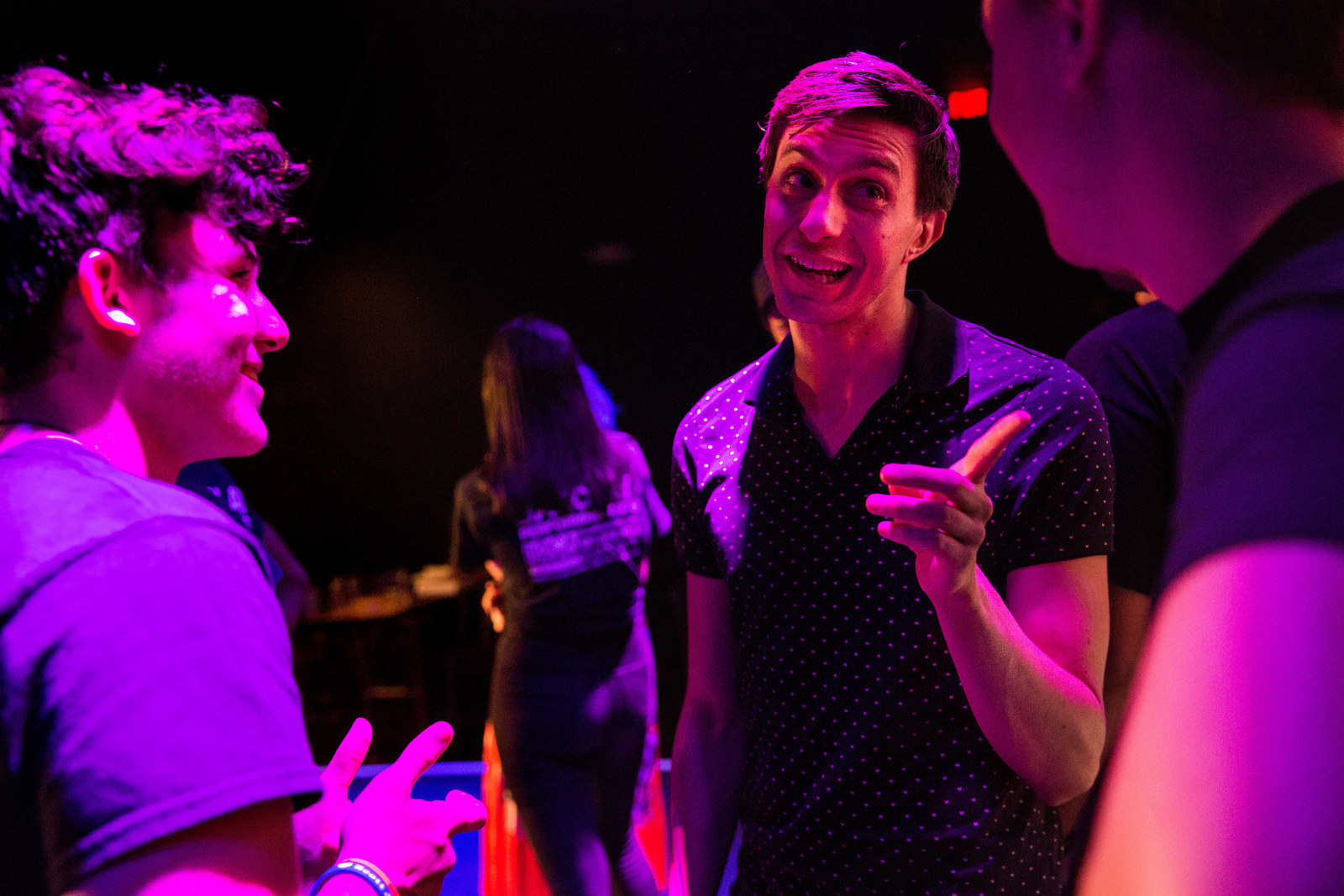
AND IN mid-April, most of the original Broadway cast of Spring Awakening came down to Boca to meet with them for a master class, and I relied heavily on Alexis Soloski's New York Times piece, along with my own conversations with Barclay and some of the students, to reconstruct it. Lea Michele, Jonathan Groff, Gideon Glick, and half a dozen more flew in. Lilli Cooper was starring in SpongeBob SquarePants on Broadway, so she FaceTimed. Lots of press appeared to capture it, and the New York Times led its arts section with a feature. The kids idolized these people, and Barclay was eager to bring not only joy to their lives, but wisdom as well. These actors had navigated the peril of dark material: how to take the character to the dark place, without getting lost there yourself.
Both generations warmed up together. Then the pros took seats near the stage to watch them rehearse. They left a few rows open to give them a little breathing room. Phoebe Strole, who played Anna on Broadway, sobbed. She praised their vulnerability during the feedback period. “I can see in your faces and on your bodies what we felt as well when we were first doing the show,” she said. “It’s like taking your heart out of your chest and shoving it at us.”
Volume was still an issue, though. Gideon Glick, who played Ernst on Broadway, told them they had to be louder. “I don’t want to be a Jewish mother,” he added apologetically.
“Please Jewish-mother them,” Barclay said.
They wanted help with the vulnerability without discussing the source directly. Cameron was his usual silly self through most of the rehearsal, but tensed up when someone asked a question headed that way. “We want to talk less about the shooting,” he said.
The kids were generally delirious. Alfonso called the actors “his celebrity crushes and dreams.” But awe came at a price. He had to simulate masturbation a few rows away from them, big and bold, projecting way beyond them to the empty back rows. The Times described him as “ashen” when he was done.
That was nothing, Barclay said. Wait till opening night: “Simulating sex in front of their moms and dads. It’s different than getting up there for a March for Your Life speech talking about gun control.”
“It was so uncomfortable,” Cameron’s mom said. “I kept my eyes directly on the ground. I didn’t want them seeing me with my head turned. My husband had purchased the seats and in his mind front row was a great idea, but in this context, Cameron does not want to see his mother in the front row. He didn’t say that, but it was pretty obvious. I was five shades of purple, super proud.”
Opening night, most of the MFOL kids came to support Cameron, Sawyer, Alex, and all the other Douglas kids taking this on. And they were having a blast. They were scattered about the audience in little clusters, searching each other out at intermission, snickering over “The Bitch of Living,” and “My Junk,” and their friends miming masturbation. They were making plans for the prom, three nights away. During intermission, there was a mild commotion midway back in the audience. Dozens of kids were leaning in toward one magnetic figure, hidden inside a hoodie pulled up over her head, arms flailing, miming some frenetic scenario. David was beside her, giggling uncontrollably. Finally, the hood dropped back just enough to reveal a wispy little butterfly of a young woman. Emma, of course. But not everyone was responding the same. Recent MSD graduate Dylan Baierlein, perpetually silly and able to find a laugh in anything, looked stricken in the men’s room line. “It’s a lot,” he said gravely. They hadn’t even gotten to the death of his best friend yet, or the graveyard scene, but Dylan knew it was coming. He was very close to Cameron. It was hard.
It was a rollicking performance, and the crowd was cheering throughout. When the last scene arrived, and Cameron entered the graveyard, the room fell silent. He discovered Wendla’s gravestone, grasped what had happened, and collapsed onto the stage floor sobbing so convincingly through dialogue that it was hard not to picture him holding on to his brother, Holden, in lockdown. The ghost of his dead friend Moritz then appeared; Cameron told him he’d had the right idea and drew the razor to his neck. But then Wendla rose and both ghosts gently coaxed him back in song:
Those you’ve known,
And lost, still walk behind you.
All alone,
Their song still seems to find you. . . .
He put away the blade and joined them:
All alone,
But still I hear their yearning;
Through the dark, the moon, alone there, burning.
He gathered his resolve, to live on, to walk on, to call out their names, and belted out:
You watch me Just watch me. . . .
And one day all will know.
It was eerie. As if the part had been written for these kids. It practically had been. Sater and Sheik had embarked on the project to honor the children of Columbine.
The full cast returned, for a final coda number, which began:
Listen to what’s in the heart of a child,
A song so big in one so small. . . .
And when they finished, the applause was uproarious, and for several minutes, the audience remained on its feet. Twelve hundred miles away, an hour or so later, about three dozen shows would take curtain calls on Broadway, and many of their casts would bow to thunderous applause. It might sound the same, but nothing on Broadway could match the feeling in that room in Boca. This audience was applauding not just the performances, but their willingness to go there. To take us there.
Cameron, in particular. I couldn’t help but hear the voice of that Parkland teacher at the march two months earlier: “Too much responsibility for these kids.” When he wasn’t onstage that weekend, Cameron seemed light as a feather. The second show was a Sunday matinee, and three hours earlier, he was clowning around in the studio next door, trying to break a castmate out of his meditation with silly jokes. He was wearing his dog tag from the Peace Warriors. The blue one, to match his outfit.
Not too much responsibility, I thought. Just enough. But maybe I was wrong.
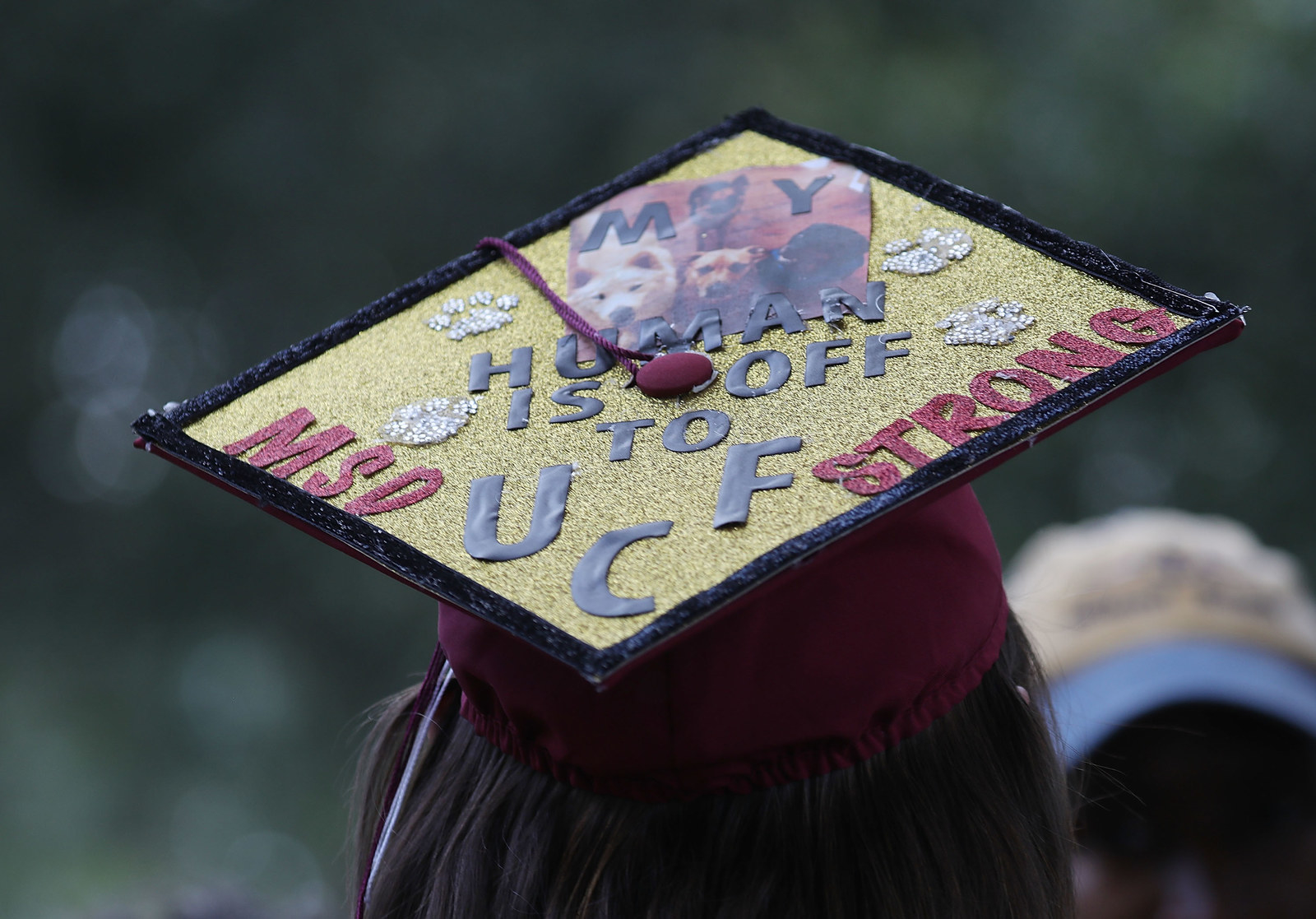
3
GRADUATION, FOR SO MANY SCHOOL-SHOOTING survivors, is the most conflicted day of their recovery. From that first day of life after “it,” graduation rises dimly on some distant horizon, painfully far and unattainable. Few kids think about it in the early days, as they console each other to “just get through it,” whatever that means. But as graduation approaches, more than any other milestone, the emotional finish line hardens into The Day: graduation from the first horrible phase. So June 3 brought a huge rush of accomplishment, a weight lifted, and for many a big FU moment to the perp. We got this!
But the pain. Meadow Pollack, Nicholas Dworet, Joaquin Oliver, and Carmen Schentrup were missing from their graduating class. That was news to no one, yet the act of eight hundred peers donning caps and gowns to celebrate, moving on to college, to life, to adulthood, without them felt almost cruel.
GRADUATION DAY was as bad as Joaquin’s father, Tío Manny Oliver, envisioned, but he would unleash his rage on a mural in Chicago twelve days later. At the graduation ceremony, he contained it. Tío Manny, who spoke to NowThis, attended with his wife and daughter. When Joaquin’s name was called out, his parents came forward, and Patricia, his mother, accepted his diploma. She wore a lemon yellow T-shirt emblazoned top to bottom:
THIS
SHOULD BE
MY
SON
The crowd roared, Patricia smiled, blew a kiss, and raised her open arms. Manny raised his fist.
“Some people thought that we weren’t going to show at graduation, because it was too sad,” Tío Manny said. “Yes, it is sad, but that’s not as important as sending a message. You need to take these opportunities and just change it. Flip them.” ●
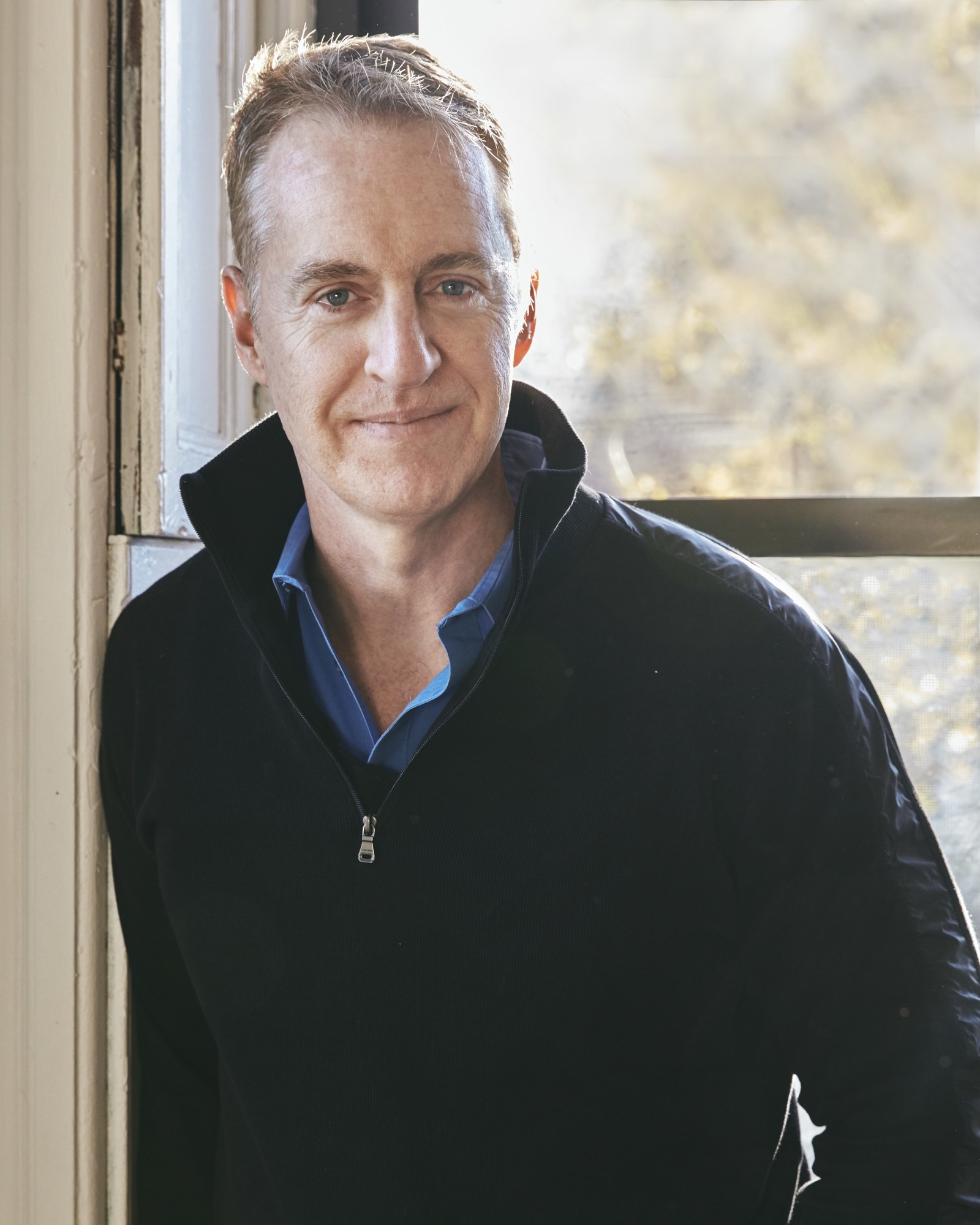
Dave Cullen is the author of Parkland and the New York Times best-seller Columbine. Cullen has also written for the New York Times, BuzzFeed, Vanity Fair, Politico Magazine, the Times of London, New Republic, Newsweek, the Guardian, the Washington Post, the Daily Beast, Slate, Salon, the Millions, Lapham’s Quarterly, and NPR’s On the Media.
Parkland is available Feb. 12.

